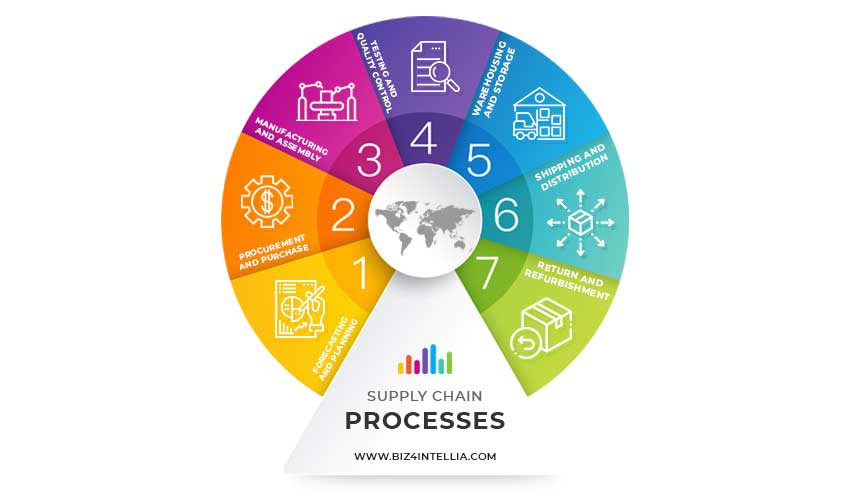A supply chain refers to a series of processes including the production and sale of a product. It comprises the entire cradle-to-grave cycle from procurement of resources to the final delivery of the finished goods with other processes like storage and manufacturing stuck in between.

Figure 1: All Process of a Supply Chain
With so many processes involved, it is quite normal for companies to have some if not many complications in their supply chain. However, the widespread acceptance of modern digital technologies like IoT is helping in end-to-end management of a supply chain. On top of conventional supply chains, IoT supply chains are a network of connected devices that enable a company to have remote and automated control over different processes.
IoT supply chain management allows a company to improve its overall efficiency and bring consistent gains to the supply chains. Various industries are now infusing the technology of Internet of Things into their complex supply chains to convert them into a fully-connected homogenous network.
Applications of Internet of Things Supply Chain:
IoT in a supply chain allows a company to monitor different operations and processes digitally. The data generated from these processes can be analyzed to produce actionable insights to revamp different operations of a supply chain.
1) Improved Inventory and Warehousing:
Warehouse Management Systems (WMS) and Inventory systems are developed to help supervisors keep a track of products stocked up in the storage units. However, these systems due to manual counting and inputting procedures have limited functionalities. Internet of Things along with sensors and RFID tags can hence be used by companies to track the assets and products stored in the warehouses.
This asset tracking help companies manage their stock levels and prevent a shortage in case of immediate high demand conditions. They can also maintain a suitable environment for products that are dependent on temperature to prevent their deterioration while they are piled up in a warehouse.
2) Visibility in Supply Chain:
Industries need to have transparency in the supply chain so that they can monitor their processes clearly. Also, consumers are now becoming more environment-friendly and making purchase decisions that support the nature. Hence, they want to know the complete cycle through which a particular product is developed. As per a study in 2015, more than 2/3rd of shoppers will pay more for a product if the company maintained a transparent and eco-friendly supply chain.
Internet of Things supply chain allows a company to do exactly the same and extend its services to eco-conscious customers. IoT along with the integration of sensors and other electronic devices help companies to monitor different processes of a supply chain and prevent disruptions that can affect the entire end-to-end operations.
Moreover, the data collected from different supply chain endpoints can be compiled and processed to develop useful insights and actions. This processed information can help the companies to boost their supply chain efficiency, increase equipment effectiveness, and enhance the overall production rate.
3) Effective Cold Chain Transport:
Cold chain transportation is a rudimental aspect of supply chains of foods, beverages, pharmaceuticals, and chemical industries. The quality and consistency of the products developed by these industries is completely dependent on environmental conditions. They are to be kept at freezing temperatures during transportation and storage. In some cases, even a minute change of 2͏°C can ruin the whole shipment.
A supply chain’s internet of things allows these industries to monitor parameters like humidity and temperature in the trailer of a truck or the cold storage from far-off locations. Through IoT’s real-time alert systems, companies can also gain notifications as soon as the parameters cross the stipulated thresholds. This will enable companies to instantly take necessary actions and avert crises related to the spoiled shipment.
4) Predictive Maintenance to Prevent Downtime:
While scheduled maintenance is the most used strategy for inspecting and repairing different equipment pieces and machines, it is not the best. As per research by ARC Advisory Group, only 18% of the failures occur due to aging equipment. The rest happen unexpectedly. Furthermore, scheduled maintenance requires a company to put an entire facility on downtime condition which affects other supply chain processes resulting in reduced overall production.
IoT in supply chain also helps companies to constantly monitor key performing indicators of equipment and conduct condition-based maintenance instead of depending on scheduled repairs. The data gathered through these machines can be used to monitor their health and performance continuously. Additionally, the feed data can also be used to identify vulnerable components that may fail suddenly. Thus, instead of depending on scheduled maintenance, companies can conduct repairs and inspection procedures as per need and reduce costly downtime and equipment breakdowns.
5) Fleet Management:
Freight transportation is also a crucial part of an IoT supply chain. This is the reason why industries logistics and e-commerce depend on their large fleet of trucks and other transportation vehicles. In addition, there are other vehicles too like forklifts and cranes that help in the management of warehouses.
It is therefore essential for these companies to keep their vehicles in tip-top conditions and regulate them autonomously. By using various GPS tools and sensors, companies can keep track of their vehicle’s location and monitor their performance remotely. They can hence increase the fuel efficiency of their vehicles and ensure timely last-mile deliveries.
CONCLUSION:
IoT supply chain management will help companies to enhance their processes and embed automation in their cradle-to-grave operations. They will gain increased visibility into their end-to-end processes and maximize their asset utilization. Furthermore, companies will be able to deliver shipments on time which will considerably elevate their customer satisfaction.











